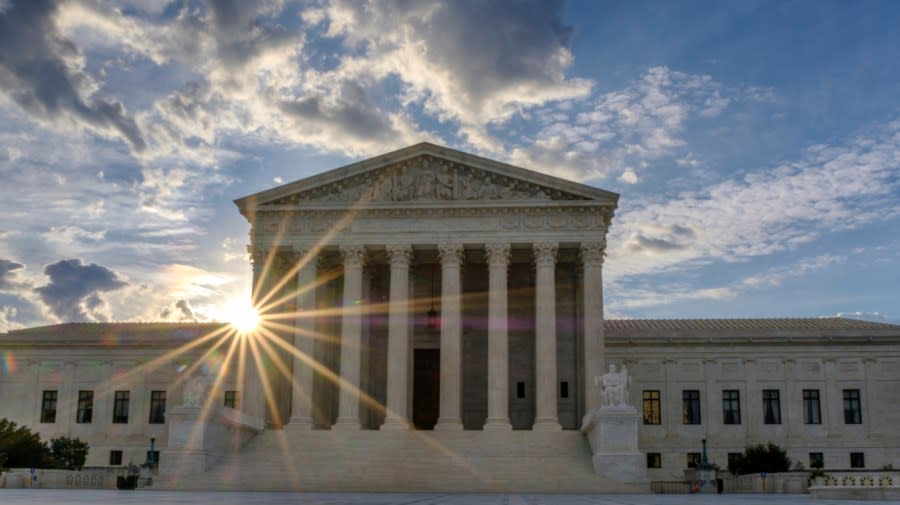Democrats cheer after Supreme Court rejects challenge to consumer bureau

Democrats and financial industry critics celebrated Wednesday after the Supreme Court rejected a challenge to the Consumer Financial Protection Bureau’s (CFPB) funding structure.
“The United States Supreme Court follow the law, and the CFPB is here to stay,” said Sen. Elizabeth Warren (D-Mass.), speaking from the steps of the Supreme Court.
Warren was one of the chief architects of the CFPB, which was established through the Dodd-Frank Wall Street reform law to enforce consumer protection laws and crack down on predatory lending. Since then, the CFPB said it has clawed back $20 billion for consumers.
“When you have an agency that is this good at doing its job to protect consumers, then a lot of banks, a lot of payday lenders, a lot of Republicans come after it and try to shut it down,” she continued.
Some Republicans have argued the CFPB’s funding structure is unconstitutional as it is not funded directly through the appropriations process. Other banking regulators, including the Federal Reserve, are funded through fees and penalties paid by firms they regulate.
But the Supreme Court voted 7-2 to dismiss the challenge brought by two lender trade associations, which argued that because the CFPB receives its funding from the Federal Reserve, it violated Congress’s appropriations authority.
Justices Samuel Alito and Neil Gorsuch were the two dissenting votes. Justice Clarence Thomas authored the majority opinion that sided with the Biden administration.
“Under the Appropriations Clause, an appropriation is simply a law that authorizes expenditures from a specified source of public money for designated purposes,” Thomas wrote. “The statute that provides the Bureau’s funding meets these requirements. We therefore conclude that the Bureau’s funding mechanism does not violate the Appropriations Clause.”
After the decision came down, House Financial Services Committee Chair Patrick McHenry (R-N.C.) vowed “Republicans will continue the fight to rein in the rogue CFPB.”
He also called on the House to pass Rep. Andy Barr’s (R Ky.) CFPB Transparency and Accountability Reform Act, which would remove the bureau from the Fed system and bring it under the appropriations process, among other provisions.
“It’s past time the CFPB is held accountable to the American people through their elected representatives,” McHenry said.
The House Financial Services Committee marked up a series of bills Wednesday that included the Clarity in Lending Act, which could curb the authority of the bureau to label certain actions as abusive.
Rob Nichols, president and CEO of the American Banker’s Association, said the powerful lobbying group would “continue to call on Congress to establish more accountability for the Bureau.”
“Only by placing limits on this rogue regulator can we ensure that consumers are truly protected and that banks can continue to provide them with the financial products they want and need,” Nichols said.
Even if bills aimed at the CFPB made it out of the House, however, it would be dead on arrival in the Democrat-controlled Senate.
Senate Banking Committee Chair Sherrod Brown (D-Ohio) called out the “powerful corporate special interests” that “have been trying to gut the agency for over a decade.”
“Wall Street tried to use the courts to kill the Consumer Financial Protection Bureau, and they failed,” Brown said.
“Today’s decision protects workers and consumers who don’t have high-paid lobbyists and lawyers to fight their battles for them. We created the CFPB to be their voice, and I will continue to ensure the agency is able to do its job protecting consumers from Wall Street greed.”
Speaking alongside Warren in front of the Supreme Court, Cassandra Gould, a reverend and senior strategist with Faith in Action, celebrated the decision.
“On behalf of the least of these today, those of us at Faith in Action are grateful that young people, old people, vulnerable people, people who need more food on their table will not fall suspect to some of the financial predators because the CFPB is intact and is able to do their work,” Gould said.
Nadine Chabrier, senior policy and litigation counsel at the Center for Responsible Lending, said the decision allows the CFPB “to keep doing its job as a watchdog agency that protects Americans’ wallets from predatory financial firms.”
“Even with this decision, we must keep fighting to defend our consumer watchdog agency in the courts and in Congress as some industry actors sue and lobby to preserve illegal financial discrimination, billions in unlawful junk fees, and other exploitative behavior,” Chabrier said.
President Biden has made tackling junk fees and cracking down on corporate price gouging a priority during his first term, including empowering the CFPB to approve a rule in March that caps credit card late fees for the largest issuers at $8.
Biden is also facing a tough reelection race against the presumptive GOP nominee, former President Trump, whose handling of the economy has been polling better with voters than Biden’s.
Drawing a line between himself and the opposing party, the president ripped “Republicans in Congress and in states across the country [who] have stood with special interests who want to keep ripping families off.”
“In the face of years of attacks from extreme Republicans and special interests, the Court made clear that the CFPB’s funding authority is constitutional and that its strong record of consumer protection will not be undone.”
For the latest news, weather, sports, and streaming video, head to The Hill.

 Yahoo Finance
Yahoo Finance 